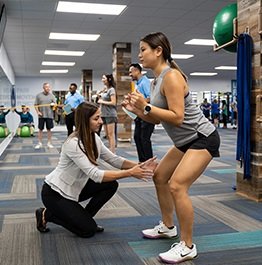
Beginner Weightlifting Tips: Train Smarter!
February 19, 201510 years ago, I decided I wanted to try weightlifting to improve my body and confidence. I had no idea what I was getting myself into or how big a role it would play in my life! Weightlifting has drastically improved my life in a number of ways including improved strength, energy, quality of sleep, and confidence.
In fact, it actually started me on the path to become a physical therapist! Even though it’s been some years now, I still clearly remember the days when I first thought about lifting weights. (You know, the days I couldn’t tell a dumbbell from a Taco Bell…) I made a lot of mistakes in those early years that led to poor results and injuries. Here are some tips from what I’ve learned so that you don’t make the same mistakes I did!
1. Set goals for yourself
What is it you want to get most out of lifting weights?
- Maximizing your strength?
- Muscle growth?
- Muscular endurance?
- How about improving performance in a sport?
Knowing your specific goal is key to customizing your program in a way that will maximize your results. Setting smaller goals on a weekly and monthly basis will also help keep you motivated and progressing towards your main goal.
[Tweet “Knowing your specific goal is key to customizing your program to maximize your results. “]
2. Design your program around your goals
Different aspects of your program can be modified to optimize your results. One example is how many times you lift a weight before fatiguing.
In general:
- Lower repetitions (3-6) best promote strength
- Moderate repetitions (6-12) lead to muscle growth
- Higher repetitions (more than 15) are best for increasing muscular endurance.
3. Allow your body to recover
Lifting weights actually breaks down muscle rather than building it. The recovery period over the next several days after a workout is where growth occurs. Give yourself at least 48 hours between workouts of the same muscle group to maximize your results.
4. Don’t sacrifice form for weight or reps
“Cheating” on your form can happen when you really want to try lifting that heavier weight or cranking out that extra rep. However, sacrificing your form typically means you’re working the target muscle groups less. It is also a common cause of acute and chronic injuries. Ease into your program initially with lighter weights and less sets to establish good form.
5. Use a spotter
You don’t want to be the person stuck under the bar when trying to lift too much weight on the bench press. It is pretty embarrassing at best, and can lead to serious injury at worst. Use a spotter on exercises that put you at risk of injury if you were to lose control of the weight.
These tips can help form the foundation of successful programs. As you progress, you will discover what works best for you. What have you learned from weight lifting? Let me know in the comments below!
Reader Interactions
Leave a comment
You must be logged in to post a comment.





